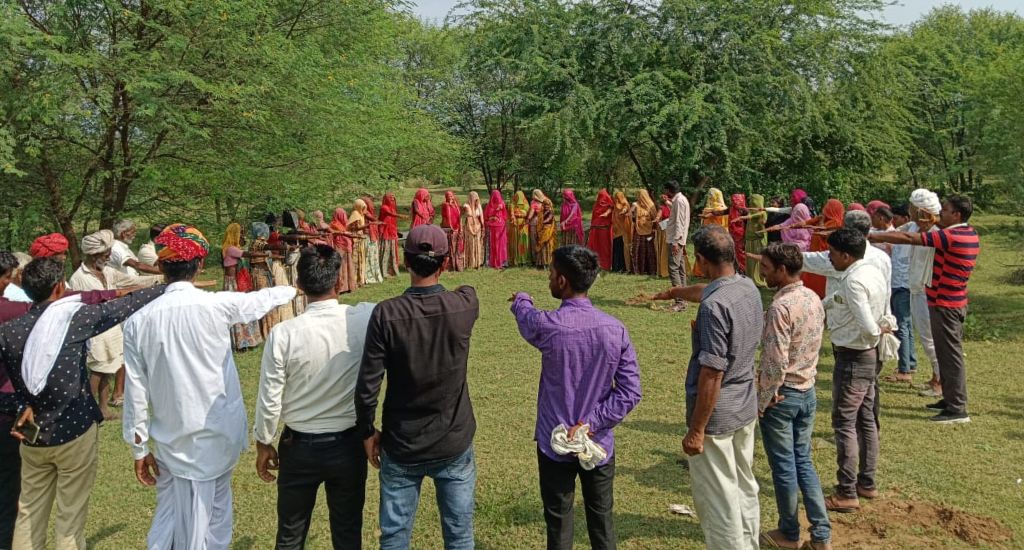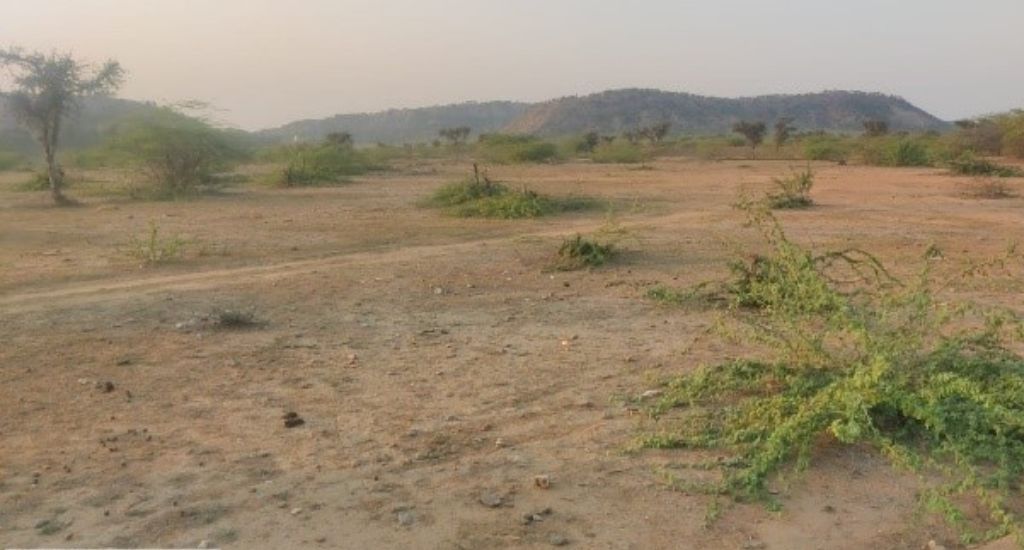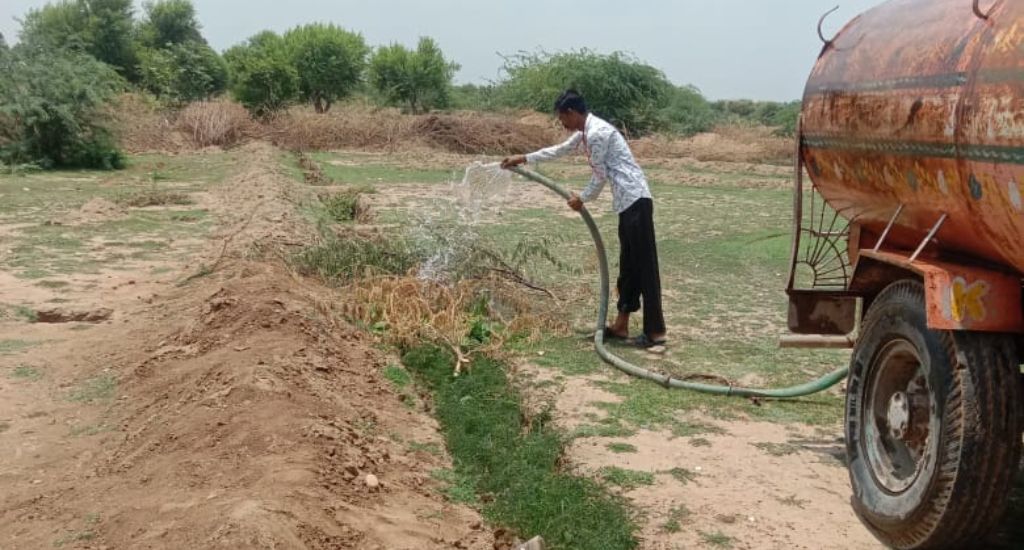
Reclaiming Rajasthan’s Khakhunda: From barren lands to green pasture
Residents of Khakhunda village in Rajasthan come together and frame bylaws to transform their barren commons that had also been encroached upon, into a green pasture land.

Residents of Khakhunda village in Rajasthan come together and frame bylaws to transform their barren commons that had also been encroached upon, into a green pasture land.
Khakhunda in Mandalgarh administrative block of Rajasthan is a revenue village marked by simplicity and interconnectedness. The village, spread across 233.26 hectares, comprises 110 households as per 2011 Census, forming a close-knit community comprising Bhil, Regar, Gurjar, Daroga, Barret and Vaishav communities living together.
The community has thrived on diverse economic threads, weaving together agriculture, livestock rearing, works under Mahatma Gandhi National Rural Employment Guarantee Act (MGNREGA), livestock management and related livelihoods. However, Khakhunda faced an intricate challenge. More than 90 percent of the pasture land had been encroached upon. The absence of formal institutional and structured bylaws for common land compounded the issue.
The village had no structures to harvest water or conserve soil moisture. Livestock grazed on common lands, creating a delicate balance between sustenance and scarcity. The absence of these foundational elements disrupted the traditional rhythm of life in Khakhunda.
In 2017, the village embarked on a transformative journey by establishing a formal institution under an initiative of Foundation for Ecological Security (FES) supported by Axis Bank Foundation. With this initiative, the land that was once barren and encroached upon, has transformed into a flourishing and vibrant landscape.
Taking insights from Section 170 (a) of the Panchayati Raj Act 1996, the Charbhuja Charagah Vikas Samiti was established in 2017. A village institution with a management committee of 18 members including women, who were trained in maintaining bank accounts, and handling records and payments, was formed. The committee’s overarching goals included fortifying local governance, ensuring efficient resource management and fostering expeditious conflict resolution within the village.

The committee took charge of 36 hectares of pasture land, replacing traditional committees and laying the foundation for Khakhunda’s commons revolution.
The collaborative efforts between the villagers and FES set the stage for insightful discussions towards transforming the commons. The Charbhuja Charagah Vikas Samiti became a crucible for these equitable discussions and inclusive decisions. It continues to serve as a means for echoing the voices of the entire community, including the marginalised people and women.
Drawing from traditional wisdom, bylaws were drafted, and the governance mechanism and resource management were strengthened.
The village institution members are selected based on collective decision, doing away with caste and gender divides.

Lopping of wet wood is strictly prohibited, as per the bylaw. If necessary, the person must get the village institution’s permission.Equal benefits are extended to everyone without discrimination based on caste or class. Pasture land is under community protection, locally known as the ora system.
Collective resolution of conflicts is mandated. The same applies for any changes to the rules. The management committee is responsible for maintaining financial records and ensuring transparency.
The first challenge for the village institution was to take actual control of their shared pasture land. Some members opposed this takeover and lodged complaints with the gram panchayat and the office of the subdivisional magistrate at Mandalgarh. Despite initial challenges, persistent efforts eventually led to their regaining control of the land.
In 2019, they initiated significant works such as construction of continuous contour trenches and cattle protection trenches through MGNREGS. The villagers prioritised eradication of invasive lantana which harms ecosystems, reduces biodiversity and increases wildfire risk.

Fencing measuring 3,031 m around the pasture land in 2020 further solidified Khakhunda’s commitment to sustainable resource management. In 2023, the central government’s Nadi Tak Vruksha Mala Project facilitated planting of 4,000 saplings in the pasture land, showcasing a holistic approach to environmental conservation.
The impact of Khakhunda’s initiatives is quantifiable.
As much as 36 hectares of pasture land is now under community governance, with soil moisture conservation work covering 21 hectares. The cattle protection trench serves not only as a safeguard but also as a water storage facility, accumulating 90 lakh litres in eight cycles. Continuous contour trenches, over a stretch of 7,350 metres, boast a storage capacity of 1 crore litres in eight cycles.
This collective effort has significantly reduced soil erosion and increased vegetation. The pre-monsoon groundwater level increased from 329.1 metres in 2021 to 334.7 metres in 2023 from the mean sea level, as per the data from groundwater monitoring tool (GWMT) app developed by India Observatory, which is an initiative of FES.
Khakhunda’s resilience isn’t confined to the quantifiable achievements listed above. The reclamation and governance of their pasture land have brought about ecological benefits that echo beyond the boundaries of the village.
At the heart of this narrative stands Narendra Singh, the secretary of the village institution, who advocates passionately for village meetings, and showed his commitment in the face of familial opposition.
The harmonious coexistence of sustainable resource management and livelihood opportunities has improved the ecological health of the region.
The village institution, now a vibrant entity, orchestrates regular meetings and efficiently manages responsibilities related to their pasture land. Future plans include leveraging MGNREGS funds for additional pasture land development, to ensure a sustainable future for Khakhunda.
The lead image at the top shows villagers taking oath to safeguard their pasture land in Khakhunda. (Photo courtesy FES)
Harshal Mankar is the Assistant Project Manager at FES, Rajasthan.